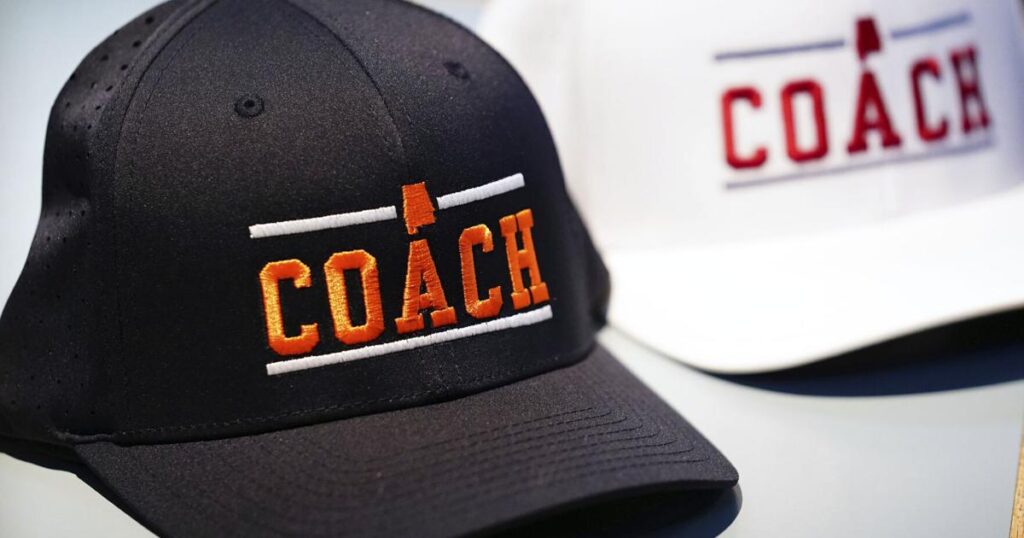In Auburn, Alabama, U.S. Senator Tommy Tuberville is eyeing a bid for the state’s governorship, yet his campaign branding still heavily leans on his athletic past. Despite his current political role, his campaign materials prominently feature his former identity as a football coach.
“Check out the hat,” Tuberville told supporters at Byron’s Smokehouse, a popular barbecue spot where he once served as Auburn University’s head football coach. “For over four and a half years in D.C., I’ve been called ‘coach,'” he added with a grin. “And as governor, I want you to call me ‘coach’ again.”
This folksy approach exemplifies how Tuberville’s persona-rooted in his sports career-serves as a strategic branding tool, illustrating the seamless transition from athletic hero to political figure. His down-to-earth demeanor resonates with voters, reinforcing his image as a relatable, familiar face in Alabama politics.
Michael Giardina, a sports culture expert at Florida State University, emphasizes that sports serve as a unifying force across the United States, connecting diverse communities through shared passions. Consequently, it’s unsurprising that politicians often leverage sports figures’ popularity to bolster their campaigns, or that athletes themselves transition into political roles.
While a sports background can provide a significant advantage, Giardina notes that athletic fame alone rarely guarantees electoral success. Instead, it offers a valuable platform that can be built upon, much like other celebrity endorsements in politics-think of Donald Trump’s use of celebrity status to energize his campaigns.
From the Field to the Campaign Trail: Notable Athlete-Politicians
For Tuberville, Football Was a Shortcut to Political Office
Tuberville’s coaching career at Auburn spanned nearly a decade, from 1999 to 2008. After a stint at Cincinnati that ended in 2016, he contemplated running for governor in 2018 but was sidetracked when a term-limited governor resigned, elevating then-Lieutenant Governor Kay Ivey to the position. Instead, Tuberville shifted his focus to the Senate, where he campaigned fiercely as a Trump supporter in 2020 and secured a decisive victory.
This ease of moving between high-profile roles underscores how well-known Tuberville remains in Alabama, where his coaching days left a lasting impression. “I’ve visited every high school in the state,” he remarked recently, highlighting his deep roots in local communities.
With Ivey now term-limited, Tuberville has returned to his primary pursuit-politics. His sports background continues to be a central theme in his campaign messaging. “I see myself as a recruiter,” he said, promising to attract new jobs and economic growth to Alabama, echoing his coaching days.
Legends of the Game Transitioning to Politics
Many iconic athletes have successfully made the leap into political life, leveraging their fame and leadership skills. Gerald Ford, a former Michigan football star, became the 38th U.S. president, bringing his athletic discipline into the Oval Office. Ford played college football at Michigan, where he was a key player on national championship teams in the early 1930s and was named team MVP in 1934.
Similarly, other sports legends have used their athletic credentials as a springboard into public service. Ford’s presidency was marked by a tradition of playing Michigan’s fight song at official events, blending his sports identity with his political role.
In the realm of basketball, Bill Bradley’s transition from NBA star to U.S. senator exemplifies how sports fame can translate into political influence. Bradley’s tenure in the Senate was distinguished by his advocacy for healthcare reform and his run for the Democratic presidential nomination in 2000.
Baseball Hall of Famer Jim Bunning also exemplifies this pathway. After a successful career with the Detroit Tigers and Philadelphia Phillies, Bunning entered politics, serving as a Kentucky state legislator, then a U.S. congressman, and finally a senator. He was known for his outspoken stance on steroid use in baseball and his dedication to public service.
From the Octagon to Congress: MMA Fighters Enter Politics
Sharice Davids, a Kansas congresswoman, used her background as an amateur and professional MMA fighter to energize her 2018 campaign. Her story highlights the increasing visibility of women in sports and politics. “Fighting has been a part of my life-I’ve been knocked down, pushed aside, and fought my way through,” she shared in an ad showing her training in the gym.
While male athletes dominate the political landscape, the rise of women’s professional sports-like the WNBA-offers new opportunities for former athletes to enter the political arena. Giardina notes that as women’s sports gain popularity, more former athletes will find platforms to influence public policy, especially as role models for younger generations.
Prominent figures like WNBA star Caitlin Clark and Olympian swimmer Katie Ledecky are becoming household names, normalizing the idea of athletes as political figures. Giardina suggests that someday we might see politicians like “Senator Caitlin Clark from Iowa,” illustrating the expanding scope of athlete-politicians in American politics.
___

